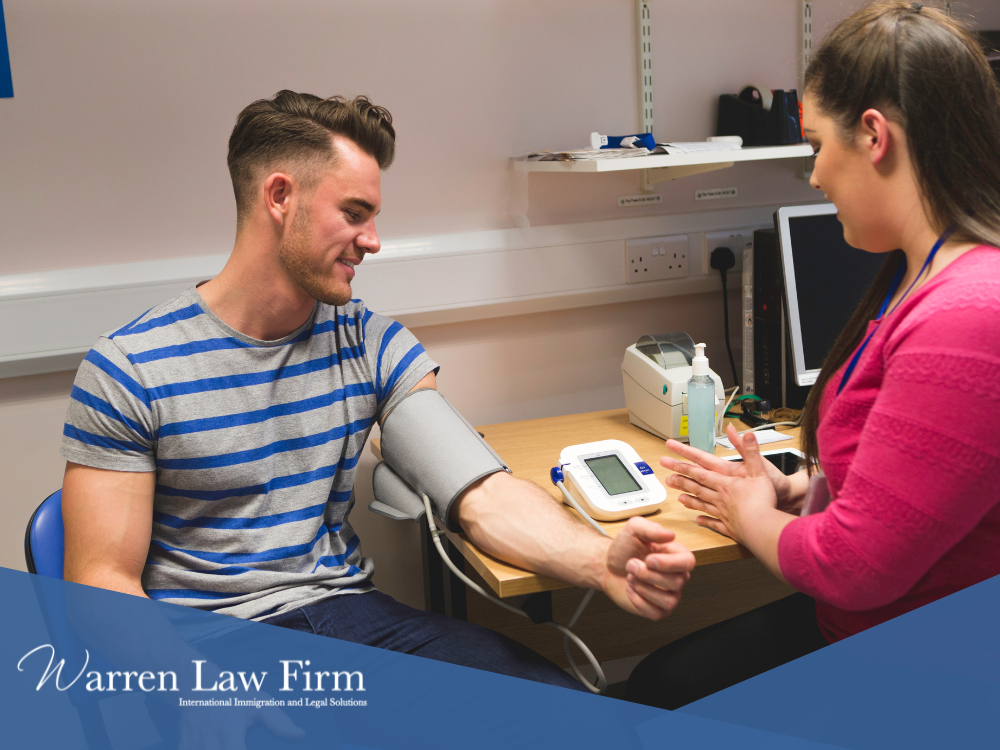What to Expect, and How to Prepare for the U.S. Immigration Medical Exam
Home » Guide to Green Cards From a Green Card Lawyer » What to Expect, and How to Prepare for the U.S. Immigration Medical Exam

Part of your green card application process will involve taking an immigration medical exam. Here, we’ll go into detail about the purpose of the exam, what tests will be performed, how to find a doctor, and what to do with your results.
Why is a Medical Exam Required Before Immigrating to the U.S.?
The purpose of the immigration medical exam is to safeguard the health of the United States population by ensuring that an applicant for a green card meets health requirements for admissibility and does not present a health threat to the public. And to ensure that a green card applicant isn’t likely to become a public charge due to their condition.
What Physical Conditions Will Make You Inadmissible to the U.S.?
An applicant who has a disease that can be transferred from person to person, and the disease presents a significant health risk to the U.S. population—or if the disease simply doesn’t exist among the population, the applicant will be deemed inadmissible to the country. According to the U.S. Department of Health and Human Services (HHS), such health conditions include:
- Tuberculosis (Class A Tuberculosis, which means it’s active)
- Syphilis (at its infectious stage)
- Gonorrhea
- Leprosy (Hansen’s Disease)
It’s important to note that, per HHS regulations, HIV (Human Immunodeficiency Virus) is not considered to be communicable—able to be transferred from person to person—and is not a disease that’s of public health significance. USCIS provides more detail about communicable diseases that are of significance to public health.
When it comes to mental or physical disorders, there are other certain conditions that make someone inadmissible.
A person who has a mental or physical disorder, and engages in harmful behavior because of that disorder, will be inadmissible.
Even if the disorder existed in the past, if it produced harmful acts that are likely to happen again—or lead to other harmful acts, that person will be inadmissible.
A green card applicant may also be inadmissible if a disorder or disability makes them likely to become a public charge.
A public charge is someone who will likely depend on the U.S government as their primary source of financial support.
What Vaccinations Are Required for Immigration?
To be admissible to the U.S., you must have completed certain vaccinations. According to the Immigration and Nationality Act (INA), you must have completed vaccinations for conditions that include:
- Polio
- Pertussis
- Measles, mumps, and rubella
- Hepatitis B
- Tetanus and diphtheria toxoids
The Centers for Disease Control and Prevention (CDC) mandates certain vaccinations for conditions that include:
- Influenza
- COVID-19
- Pneumococcal pneumonia
- Meningococcal
- Hepatitis A
Neither of these lists are exhaustive. USCIS provides a complete list of vaccination requirements for immigrants.
Request A Consultation
Meet The Attorney
Angela D. Warren
With more than 20 years of immigration and business immigration experience, Angela Warren has helped hundreds of individuals, families and businesses.
Main Services




Get The Immigration Help You Deserve
What Documents Do You Need to Bring to Your Medical Exam?
 You should bring your government-issued photo ID, your health insurance card, and all documents that demonstrate as much of your medical history as possible, including:
You should bring your government-issued photo ID, your health insurance card, and all documents that demonstrate as much of your medical history as possible, including:
- Records of your vaccination history
- Copies of chest X-rays performed in the past
- A letter from your primary care doctor outlining your treatment plan for any existing health issues
If you’re applying for a green card within the U.S., bring Form I-693, Report of Medical Examination and Vaccination Record, for a physician to record your exam results. You can get the most current version of the form from the USCIS website.
What Actually Happens During the Exam?
Your immigration medical exam will involve multiple components that include:
A review of your medical history. A physician will investigate whether you have had significant events in your health history, like a hospitalization or a severe illness. They’ll inquire as to whether you have ever been placed in an institution due to a chronic physical or mental condition.
A physical exam. The doctor will examine your ears, nose, throat, eyes, abdomen, heart, lungs, skin, and lymph nodes, among other parts. You’ll also have a chest X-ray, and a blood test to check for syphilis.
A mental exam. The doctor will examine your mental health and assess your intelligence, behavior, comprehension, mood, and judgment.
A blood and urine screening. If you are 15 years old or older, you will be required to take a urine test to check for gonorrhea and a blood test to check for syphilis.
Drug and alcohol screening. The physician will ask if you take any prescription medicines and inquire as to whether you have partaken of drugs or alcohol—in the past or present. They will also ask if you have a history of substance abuse.
Can Any Doctor Perform Your Exam?
Your exam must be administered by a doctor who is authorized by the U.S. government. If the doctor isn’t government authorized, you won’t be able to use their exam results. If you are applying for a green card from outside the U.S., the consulate or embassy will furnish you with a list of panel physicians that the Department of State has certified.
If you’re applying from within the U.S., a civil surgeon who is authorized by USCIS will perform your exam.
Can You Schedule Your Exam Before You Apply for a Green Card?
You may schedule your medical exam before your green card application process begins. If you do so, however, you may not have your exam performed and Form I-693 signed any earlier than 60 days before submitting your application.
You have the option to schedule your exam after you submit your application. Just be sure to send the exam results to USCIS right away—or carry them to your green card interview.
Who Handles the Results of Your Medical Exam?
When applying for a green card outside the U.S, the process for managing the results of your exam depends on your country’s requirements. The doctor may give you a sealed envelope to carry to your green card interview or send the results directly to the consulate or embassy.
Do You Need to Talk to an Attorney About Applying for a Green Card or Preparing for an Immigration Medical Exam?
If you would like to apply for a green card, or if you need a better understanding of what happens during an immigration medical exam, our team is here to help and provide you with the legal guidance you need. Call our office today to schedule a consultation.
